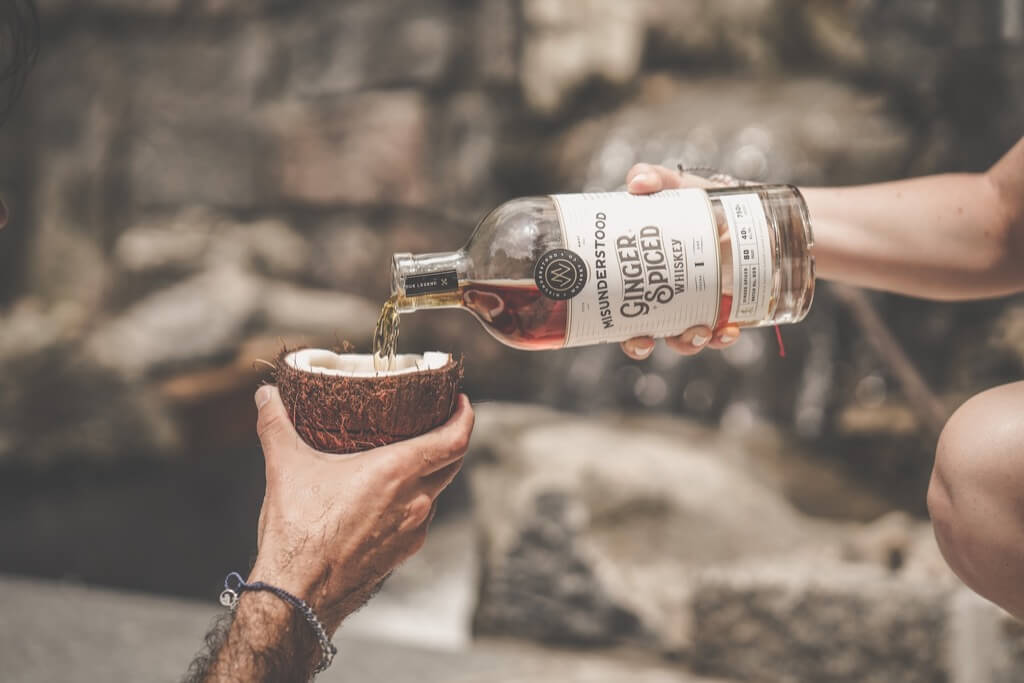Whiskey is, in a nutshell, not animal-based. Whisky is made with water, yeast, and a grain of cereal.
I say, nevertheless, we examine it more closely. In what contexts might whisky not be OK for vegans to consume? There are, as it turns out. Looking at the production process can help us understand why whisky isn’t always vegan.
To begin, why is whiskey typically not considered vegan? Three things are needed to make whisky: water, yeast, and a grain of cereal. Only malted barley can be used to make single-malt scotch whisky. Other entire grains, including corn, rye, or wheat, can also be used to make grain whisky or bourbon. Here you can get additional information about the process of making whisky. To sum up, though, for a plant-based diet, it is gravy. Unfortunately, vegans aren’t allowed gravy, so that was a poor word choice. However, if whisky is produced using only water, yeast, and grains, then it can be consumed by vegans. However, a very committed vegan should abstain from whisky in these situations:
- Cream or honey-based whiskey liqueurs
One whisky liqueur that has persisted through the ages is Brose. Whisky, honey, oats, and cream are the main ingredients. Modern whisky liqueurs are most famous for Drambuie. Captain John MacKinnon supposedly received the recipe from Bonnie Prince Charlie in 1746 in exchange for asylum on the Isle of Skye, according to legend. Whisky, spices, herbs, and heather honey come together to make it. This product is not suited for vegans due to the use of honey. The Volunteer State One further example would be Jack Daniel’s honey. Additionally, vegans should avoid Columba Cream, which was made on Mull in 1982 and contains both cream and honey. It’s almost like Bailey’s Irish Cream, but I hate to break it to you vegans, but it’s great.
Finished Whiskies from Port Cask
Now let’s take a look at the potential finishing issues that vegans may face. Perhaps everything you’re eating is suitable for vegans. However, if the whisky was completed in an exotic cask, it can be problematic for a devout vegan.
Whisky aged in port casks is a growing trend. A few names that spring to mind include GlenDronach, Glenmorangie, and Kavalan. Both wood-aged and bottle-aged Ports are available. Before being bottled, Wood-Aged Ports pass through a filter. As a fining agent, such filters use gelatin, which isn’t exactly vegan-friendly. Additionally, vegans should avoid gelatin.
Just so you know, Aged Ports in bottles aren’t filtered. That being said, vegetarians can eat them. However, whisky that has been finished in an ex-port cask may have come into touch with gelatin, which is one reason a vegan might not be able to consume it. Being a non-vegan, I can’t say for sure how significant that is to others, but I find it intriguing to learn.
A Look into Lincoln County and Tennessee Whiskey
Our good buddy Jack Daniels could be the next target. We’ve covered the fact that honey is an ingredient in Tennessee Honey before. For yet another reason, vegetarians might want to pass on a Tennessee whiskey. Thanks to the Lincoln County Process, Tennessee whiskey can be distinguished from ordinary bourbon. Ten feet of sugar maple charcoal is filtered through Tennessee whisky before bottling. Now, boiling animal bones could produce some charcoal. At Jack Daniels, this is not the case. Would the charcoal not be vegan, though, if you were to compare other Tennessee Whiskey brands? But that might be clinging to a straw instead of burned animal bones.
However, whisky may still be problematic for vegans in one more way, if we are discussing flimsy connections. That is in addition to the bottle’s label. Caseins, among other polymers, may be present in some label adhesives. Cattle milk is the source of caseins. So, one may make the case that the product is not suited for vegans due to the adhesives used, but that’s a tricky matter.
Whiskies To Avoif As A Vegan

Vegans looking to enjoy whiskey need to be aware of certain brands and types of whiskey that may not align with their dietary and ethical preferences. While most traditional whiskies (straight from the barrel and without additives) are vegan-friendly, there are specific categories and brands that vegans should be cautious of. These mainly include whiskey liqueurs and certain specialty whiskies:
Whiskey Liqueurs with Cream or Honey
-
- Baileys Irish Cream: One of the most famous cream-based liqueurs, it combines Irish whiskey with cream and other flavorings. Not suitable for vegans due to its dairy content.
- Drambuie: A Scottish liqueur made from Scotch whisky, honey, herbs, and spices. The inclusion of honey makes it non-vegan.
- Jack Daniel’s Tennessee Honey: This is a honey-flavored whiskey liqueur. The honey content makes it unsuitable for vegans.
- Bushmills Irish Honey: Similar to Jack Daniel’s Tennessee Honey, this is a honey-infused whiskey and not vegan-friendly.
- Columba Cream: A Scottish cream liqueur made with Scotch whisky, cream, and honey, it is not vegan due to both cream and honey.
Whiskies Finished in Port or Wine Casks
-
- Certain whiskies are finished in port, sherry, or wine casks which might have been sealed using animal-derived products like gelatin during the winemaking process. While it’s less common for the whisky itself to come into direct contact with these non-vegan materials, strict vegans might choose to avoid them as a precaution.
- Glenmorangie Quinta Ruban: Aged in port casks, this whisky might pose a concern for vegans due to the potential use of animal products in the port’s production process.
- Balvenie DoubleWood: It is aged in sherry casks, which could raise similar concerns as port cask finishes.
Whiskies Using Animal-Derived Filtering Processes
-
- Tennessee Whiskies: Some Tennessee whiskies use the Lincoln County Process, which involves filtering through charcoal. In some cases, this charcoal might be derived from animal bones. Brands like Jack Daniel’s, however, state that they use plant-based charcoal, making them suitable for vegans.
Whiskies with Non-Vegan Label Adhesives
-
- This is a more obscure concern and harder to verify. Some whiskey labels may use adhesives derived from animal products. It’s challenging to identify specific brands that use non-vegan adhesives, as this information is not commonly disclosed.
Tips To Find The Best Vegan Whiskies
Understanding Vegan Certification
When searching for vegan whiskies, you should look for official vegan certifications on labels. These certifications are granted by reputable organizations and indicate that the product has met strict vegan standards. This can save you time and effort in researching each brand’s production process.
Utilize Vegan-Friendly Whiskey Lists Online
Leverage the power of the internet to find your ideal vegan whiskey. There are several websites and online communities dedicated to vegan lifestyles that regularly update lists of vegan-friendly alcoholic beverages, including whiskey. Websites like Barnivore.com can be a valuable resource for you to quickly determine if whiskey is vegan.
Direct Communication with Distilleries
Don’t hesitate to contact whiskey distilleries directly. Most companies are more than willing to answer your queries regarding their production practices. This direct communication can give you peace of mind, ensuring that your whiskey choice aligns with your vegan principles.
Real-Life Vegan Whiskey Brands
Keep an eye out for brands known for their vegan-friendly production methods. Brands like Ardbeg, Glenlivet, and Maker’s Mark are renowned for producing whiskey that aligns with vegan standards. Remember, while the majority of whiskies are vegan by default, it’s the additional flavors, finishes, and processing methods you need to be cautious about.
Explore Organic Whiskey Options
Organic whiskies often adhere to stricter production standards, which sometimes include vegan-friendly practices. Exploring organic whiskey brands might lead you to some excellent vegan options. Organic labels often imply a dedication to natural processes and ingredients, which align with many vegan values.
Stay Informed about Ingredients and Processes
Educate yourself about the ingredients and processes that typically make whiskey non-vegan. Knowing about potential non-vegan ingredients like honey or cream, as well as production processes like the use of animal-derived fining agents or adhesives, empowers you to make informed choices.
Social Media and Forums
Engage with vegan communities on social media and forums. These platforms can be a treasure trove of information, with many users sharing their findings and recommendations for vegan whiskies. You can also contribute to these communities by sharing your discoveries, further supporting fellow vegans in their quest for the perfect dram.
Vegans can enjoy the majority of whiskies. A couple of notable exceptions are liqueurs made with cream and whiskies made with honey. A couple of additional points should be mentioned. Some examples of this include whiskies aged in port, charcoal-aged Tennessee whiskey, and the adhesive used to seal bottle labels. Vegans have the freedom to choose when it comes to these specifics.

